The 2020 Mac Mini Unleashed: Putting Apple Silicon M1 To The Test
by Andrei Frumusanu on November 17, 2020 9:00 AM ESTBenchmarks: Whatever Is Available
As we’ve had very little time with the Mac mini, and the fact that this not only is a macOS system, but a new Arm64-based macOS system, our usual benchmark choices that we tend to use aren’t really available to us. We’ve made due with a assortment of available tests at the time of the launch to give us a rough idea of the performance:
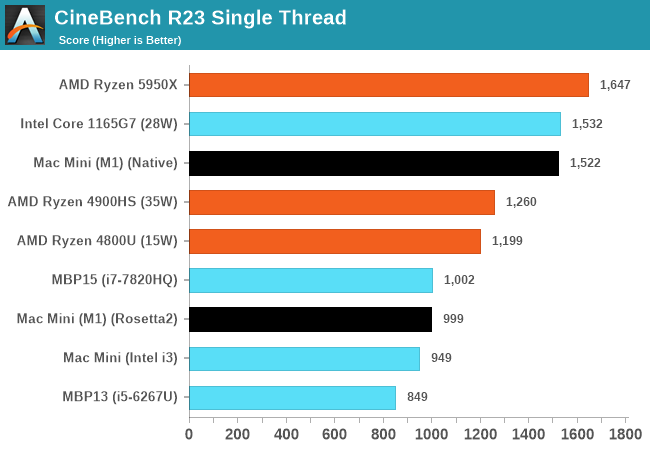
One particular benchmark that sees the first light of day on macOS as well as Apple Silicon is Cinebench. In this first-time view of the popular Cinema4D based benchmark, we see the Apple M1 toe-to-toe with the best-performing x86 CPUs on the market, vastly outperforming past Apple iterations of Intel silicon. The M1 here loses out to Zen3 and Tiger Lake CPUs, which still seem to have an advantage, although we’re not sure of the microarchitectural characteristics of the new benchmark.
What’s notable is the performance of the Rosetta2 run of the benchmark when in x86 mode, which is not only able to keep up with past Mac iterations but still also beat them.
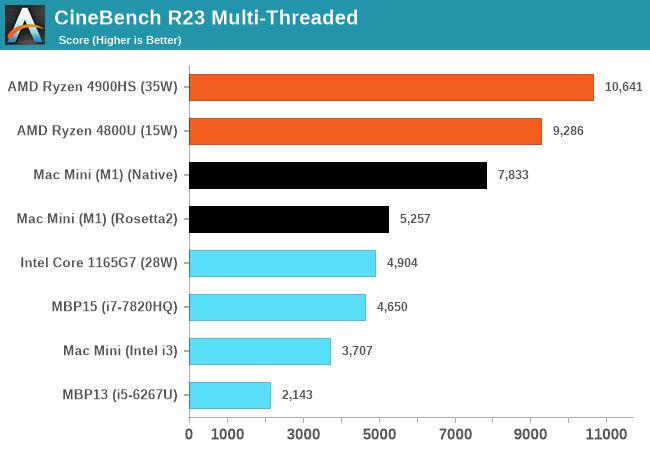
In the multi-threaded R23 runs, the M1 absolutely dominates past Macs with similar low-power CPUs. Just as of note, we’re trying to gather more data on other systems as we have access to them, and expand the graph in further updates of the article past publishing.
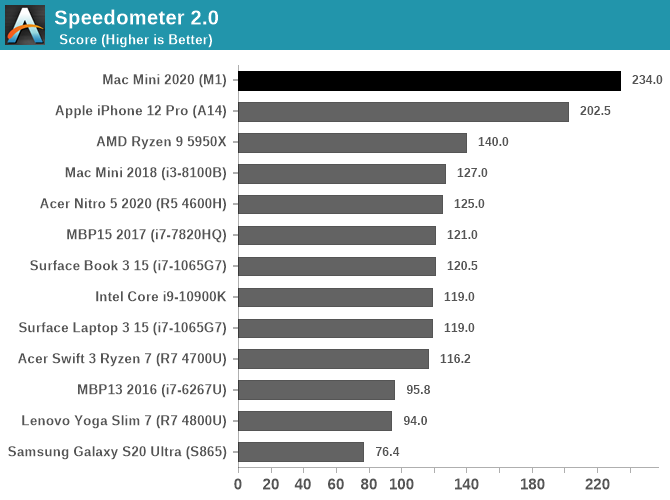
In browser-benchmarks we’ve known Apple’s CPUs to very much dominate across the landscape, but there were doubts as to whether this was due to the CPUs themselves in the iPhone or rather just the browsers and browser engines. Now running on macOS and desktop Safari, being able to compare data to other Intel Mac systems, we can come to the conclusion that the performance advantage is due to Apple’s CPU designs.
Web-browsing performance seems to be an extremely high priority for Apple’s CPU, and this makes sense as it’s the killer workload for mobile SoCs and the workload that one uses the most in everyday life.
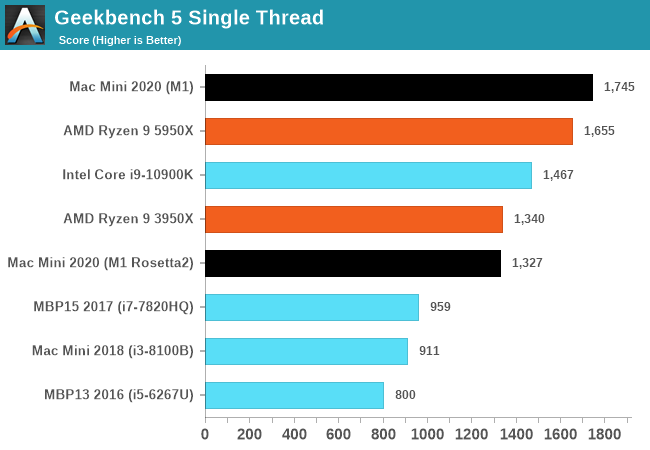
In Geekbench 5, the M1 does again extremely well as it actually takes the lead in our performance figures. Even when running in x86 compatibility mode, the M1 is able to match the top single-threaded performance of last generation’s high-end CPUs, and vastly exceed that of past iterations of the Mac mini and past Macbooks.
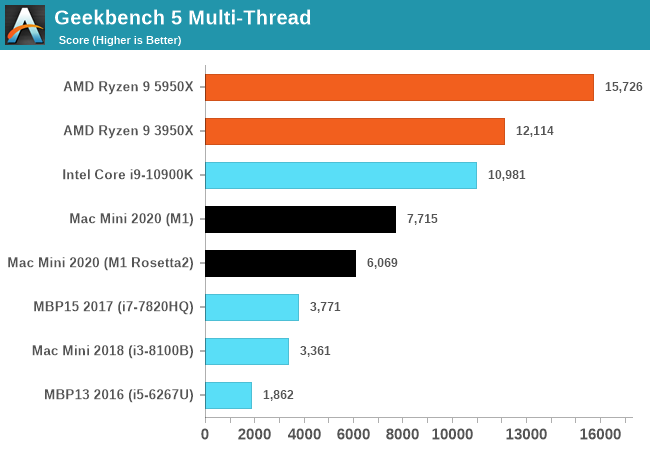
Multi-threaded performance is a matter of core-count and power efficiency of a design. The M1 here demolishes a 2017 15-inch Macbook Pro with an Intel i7-7820HQ with 4 cores and 8 threads, posting over double the score. We’ll be adding more data-points as we collect them.


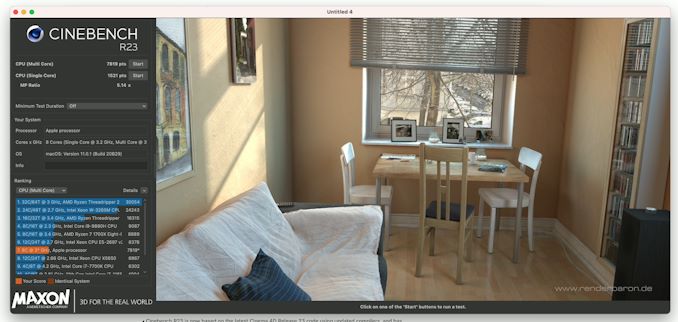








682 Comments
View All Comments
shadowii - Tuesday, November 17, 2020 - link
You're not sure because you must not have read the article. May I suggest decoupling your self-esteem from chip performance from companies that don't personally care about you?PhotinoBird - Tuesday, November 17, 2020 - link
This is literally Apple's first and lowest end chip. Like, this is the CPU they put in the laptop with no fan. AMD is certainly top of the heap here in a lot of ways, and that's great. But you can't deny that Apple's first kick at the can with their least powerful and least expensive chip is very impressive, delivering extremely high performance at a powerdraw that is simply unheard of right now in laptops.YesYesNo - Tuesday, November 17, 2020 - link
This is their highest end chip.nico_mach - Tuesday, November 17, 2020 - link
Well, that's one way of putting it, but it's clearly a first effort for this segment and shot across the bow of Intel. AMD at least has a chance to catch up, and isn't losing a customer over this. Whereas Intel just got blown up. They'll be selling off the splinters soon to maximize shareholder value - they've been quite cynically milking the platform and failing, a breakup is the next logical step.YesYesNo - Tuesday, November 17, 2020 - link
There is no way to know if this is the best they can do currently or if they are holding something back.I see no reason to consider what might come out from Apple, AMD or Intel compared to what is currently out.
hugi - Tuesday, November 17, 2020 - link
Apple is replacing the processors in their entire Mac lineup in the next 24 months. There will not be M1s in the Mac Pro.mdriftmeyer - Friday, November 20, 2020 - link
That's the plan but first they have several more Intel based products in the works to extend over the next three years. And if rumors were factual it is clear they know they can't replace the Mac Pro 218 core Xeon with any possible equivalent on their part with ARM, hence the Mac Pro Mini whispered about being half the size of the current Mac Pro.If they were smart they'd drop Xeon during the transition and go Zen 3.
jbelkin - Thursday, November 19, 2020 - link
They usually announce new products around CES so look for the next batch (iMac, MBP 16"? ... 12-16 Core??) in the next 3 months.Spunjji - Tuesday, November 17, 2020 - link
For now, yes. It very soon won't be.YesYesNo - Tuesday, November 17, 2020 - link
And when it isn't i will reconsider.